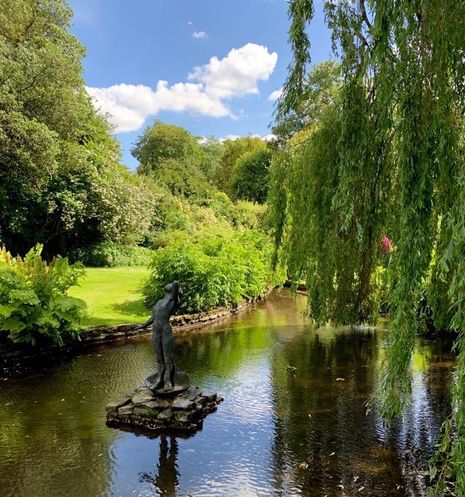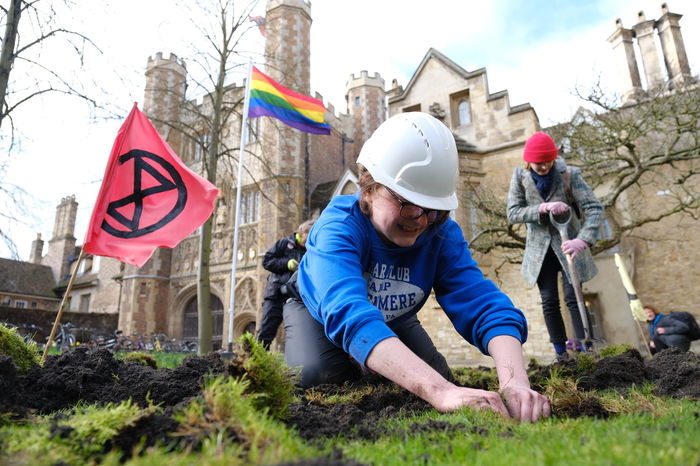The art of the English garden : a source of national and political identity
James Farquharson dissects the British people’s symbiotic relationship with nature, taking us on a journey from the famed jardin anglais to the nation’s current political field.

One of my most vivid memories as a child is playing in my grandfather’s garden. As is the way with these things, I cannot pin down an exact experience to which my memory refers. Rather, it’s a flush of warm sunlight, flowers bursting with colour and leaping out of their beds, and bushes guarding the hidden entrance to some undiscovered pathway that to my young imagination promised untold treasures.
Today, in the wisdom I’ve gathered over 20 years, I’m no longer so tantalised by the prospect of a ‘secret garden’ (they never really are). But when I scan my early years for experiences to help make sense of who I am today, this image of my grandfather’s garden comes back with strange force.
It’s not just me. The British are known for their affinity with flowerbeds for good reason. No other country in the world would devote one-and-a-half hours a week of valuable radio time to the horticultural neuroses of the nation’s avid gardeners. The programme to which I’m referring, Gardeners’ Question Time, is anything but niche, drawing listeners regularly in excess of 2 million.
So what are the reasons for this bizarre national condition? In 1745, a Frenchman, the Abbé Le Blanc, proposed a hypothesis: ‘It is to the fogs with which their island is nearly always covered that the English owe both the richness of their pastures and the melancholic spirit of their temperament.’ A tempting explanation, for sure, but I’m not sure about how the idea of an island of depressed blokes sits with me.
Man, like nature, was created with free will and should not be submitted to tight control by ruler or gardener.
Still others have tried to connect the style of English gardens to the nation’s unique political tradition. Poets and playwrights have long read notions of English political exceptionalism into the hills and valleys of its landscape, seeing there a moderate soil that has fostered devolution and diversity rather than absolutism. This was especially the case during the flurry of political thought surrounding the 1642-51 Civil War. John Milton’s 1667 epic poem Paradise Lost, an ode to the ideal of the individual conscience, rejected the formalism of ‘nice Art / In Beds and curious knots’ in his Garden of Eden. Man, like nature, was created with free will and should not be submitted to tight control by ruler or gardener.
The crystallising of an English political tradition in the 18th Century coincided with the emergence of the distinct style known as the jardin anglais, its guiding philosophy lying in not imposing the gardener’s vision too forcefully. This is reflected in Alexander Pope’s 1731 epistle to Lord Burlington, advising him ‘whatever you intend… In all let Nature never be forgot.’ Lord Burlington’s Chiswick House and the landscape gardens designed by his contemporaries created the impression of minimal human interference, so that when you walked among their lakes and rivulets you could imagine yourself lost in Arcadia. By contrast, the French gardening style of the time was characterised by symmetry and formalism. The enormous canals and clipped hedges of the seat of their absolutist ruler Louis XIV, at the Palace of Versailles, are meant above all to leave you in awe of the power of the Sun King. As you walk through its grassy corridors, looking down from on high upon the perfectly manicured parterres (‘In Beds and curious knots’), you feel that humans are truly masters of nature rather than products of it.
Even as industrialisation has run its course and the British rural population plummeted, many city dwellers still lovingly tend a plot of land as if it were a little microcosm of the pastoralism that has been lost. The importance of gardens to the British psyche has of course been capitalised on by politicians. It is no surprise, given their belief in moderation and compromise rather than top-down policies, that the Conservative party have been champions of such pro-countryside policies as the Green Belt, as a poll of its voters showed in 2019.
The importance of gardens to the British psyche has been capitalised on in politics - yet progressive politicians would do well to engage with the cultural identity of their electorate.
Yet despite the British love for their landscape, the Green Party has conspicuously failed to make many inroads into its political system. While the lack of proportional representation certainly plays a role, it seems that this technical issue is more of a scapegoat for their tone-deafness towards British voters. In the European Elections of 2019, the Green Party in Germany took second place with 20.5% of the vote, a 9.3% increase on 2014, while the UK Green Party only managed 12.1%, increasing their overall vote share from 2014 by 4.2%. Although the effects of the Climate Crisis will spare no one, the success of the German Greens is due to their ability to make Germans feel like true stakeholders by appealing to their innate conservatism. Rather than presenting themselves as part of a globalist agenda, the leaders Robert Habeck and Annalena Baerbock are not squeamish about engaging with traditional culture.
Both the Brexit Vote and the election results this year show us that progressive politicians would do well to engage more with the cultural identity of their electorate. In the UK, green politics have always been regarded as a separate issue to the more conventional economic and social agendas, which tends to marginalise them. As the conservative philosopher Roger Scruton has suggested, a green agenda can form part of the British voter’s ‘oikophilia’, or love of home. Such a strategy would avoid emulating the digging-up of Trinity College’s front lawn by Extinction Rebellion, an act likely to have been regarded by most British people as a spiteful act of vandalism and as an affront to gardeners everywhere.
 News / Caius mourns its tree-mendous loss23 December 2025
News / Caius mourns its tree-mendous loss23 December 2025 Comment / Yes, I’m brown – but I have more important things to say22 December 2025
Comment / Yes, I’m brown – but I have more important things to say22 December 2025 News / Cambridge welcomes UK rejoining the Erasmus scheme20 December 2025
News / Cambridge welcomes UK rejoining the Erasmus scheme20 December 2025 News / CUP announces funding scheme for under-represented academics19 December 2025
News / CUP announces funding scheme for under-represented academics19 December 2025 Interviews / Politics, your own way: Tilly Middlehurst on speaking out21 December 2025
Interviews / Politics, your own way: Tilly Middlehurst on speaking out21 December 2025










